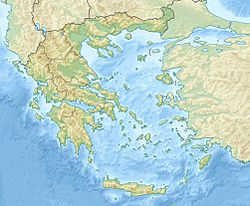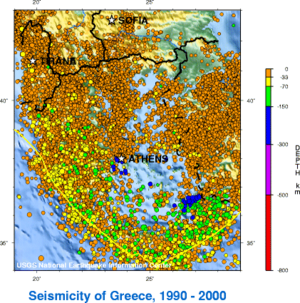464 BC Sparta earthquake facts for kids
| Local date | 464 BC |
|---|---|
| Magnitude | 7.2 Ms |
| Epicenter | 37°05′N 22°26′E / 37.08°N 22.43°E |
| Areas affected | Sparta, Greece |
| Casualties | up to 20,000 |
Imagine a huge earthquake hitting an ancient city! That's what happened in 464 BC in Sparta, a powerful city-state in ancient Greece. This earthquake was so strong it destroyed much of Sparta and other nearby cities. Some old stories say as many as 20,000 people might have died, but experts today think that number is probably too high.
This big earthquake also caused a major problem for Sparta. It gave the helots—who were like enslaved people in Sparta—a chance to rebel against their rulers. The Spartans even asked their rivals, the Athenians, for help. But when the Athenians arrived, the Spartans quickly sent them away! This event was a big deal and helped lead to a huge conflict called the First Peloponnesian War.
Contents
Why Earthquakes Happen in Greece
Sparta was located in a place called the Hellenic arc. This area often has large earthquakes. Why? Because huge pieces of the Earth's crust, called tectonic plates, are always moving there. The African Plate is slowly sliding under the Aegean Sea Plate. This movement causes a lot of shaking.
You can see the results of these moving plates in Greece's landscape. There are big mountains and many islands. The land also drops steeply into the Mediterranean Sea. Even today, Greece has earthquakes regularly. Luckily, most are much smaller than the one that hit Sparta in 464 BC.
What Happened During the Earthquake
We don't have many detailed records from the time of the earthquake itself. Most of what we know comes from a few ancient writers. These include Strabo, Pausanias, Plutarch, and Thucydides. Because of this, it's hard to know exactly where the earthquake started or how strong it was.
However, many historians believe it was a "medium to large" earthquake. It likely happened because of movement along a fault line near the Taygetus Mountains. One study in 1991 suggested the earthquake might have been around 7.2 on the surface wave magnitude scale.
Back then, buildings were not made to withstand earthquakes. Most were one story and built from wood or sun-baked bricks. This is why some experts think the number of people hurt or killed might not have been as high as 20,000. The city was also not very crowded. Still, there was a lot of damage.
The earthquake created a chance for the helots to rebel. These were the enslaved people in Spartan society. They saw the chaos and decided to fight for their freedom.
How the Earthquake Led to War
Many experts believe the 464 BC Sparta earthquake was a key event that led to the First Peloponnesian War. Before the earthquake, Sparta was already thinking about attacking Attica, the land around Athens.
After the earthquake, the helots and other groups in Messenian rebelled. Sparta needed help to stop them. They asked other Greek cities for support, as they were part of an alliance. Athens, known for its skills in attacking cities, sent about 4,000 soldiers called hoplites. These soldiers were led by a general named Cimon.
But here's where things got tricky. The Spartans suddenly sent the Athenian soldiers home! They let soldiers from other cities stay, but not the Athenians. According to Thucydides, a famous ancient Greek writer, the Spartans worried the Athenians might switch sides. They thought the Athenians were "enterprising and revolutionary." This meant the Spartans feared Athens might help the helots instead.
The Athenians felt very insulted by this. Because of this, they ended their alliance with Sparta. When the helot rebellion was finally put down, some of the rebels who survived went to Athens. Athens settled them in a place called Naupactus. This place was important because it controlled a key waterway.
The friendship between Sparta and Athens never recovered. Their disagreements grew bigger and bigger. This eventually led to the start of the First Peloponnesian War in 460 BC. The earthquake gave the helots a chance to rebel, which forced Sparta to deal with that problem before they could fix other things in their society.
See also
- List of earthquakes in Greece
- List of historical earthquakes
 | James B. Knighten |
 | Azellia White |
 | Willa Brown |



